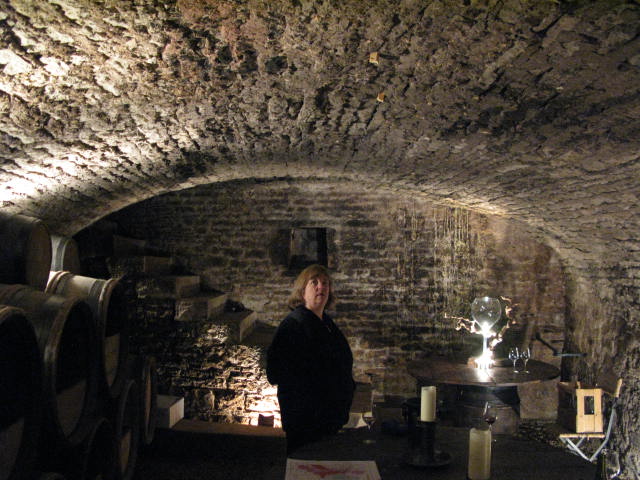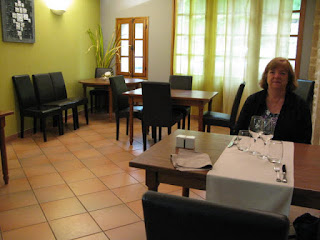The weather is still
rainy and cold. We stayed close to the gite for most of the day. Marie brought over a traditional regional ginger spice cake the
previous evening and Mary enjoyed that for breakfast.
Lunch was leftover
charcuterie, sliced peaches, salad, and cheese.
The cheese next to the salad bowl in this photo is Reblochon. It comes from the Savoie region in the French
and Swiss Alps. I love this cheese. It is a soft, washed-rind cheese made from
raw cow’s milk. It is illegal in the
U.S. because of a ban on importation of soft cheese made from unpasteurized
milk. It’s great for fondue, grilled
cheese sandwiches, and casseroles, or a lunchtime nibble like this. The closest thing to it in the U.S. is
probably Camembert or Raclette.
We went for a late
afternoon tasting at Domaine Michel et Joanna Ecard in Savigny-les-Beaune
before our dinner reservation at Lu Cuverie.
Michel arrived just after we arrived and invited us to the cellar.
We descended through cellar doors from the courtyard
down stairs so steep that we went down backward, as if going down a ladder.
Michel doesn’t know when the cellars were
dug, but they are adjacent to l’eglise in Savigny-les-Beaune,
so he thinks they are probably from the 11th or 12th
century, between 900 and 1,000 years ago.
Amazing!
Michel and Joanna formed
their domaine only in 2005. Michel’s
family had a large estate with his father and brothers, but he and Joanna
wanted to strike out on their own. He
and Joanna now own about four hectares of vineyards, which is about 10
acres. From the wines he produces, he
supports himself, his wife, and two children.
He makes white and red wine, both village and premier cru. The operation is very hands-on. When we shook hands after the tasting, his
callused, weather-worn hands attested to his involvement in every aspect of
production in his domaine, from vineyard to bottle. Michel grows the grapes and makes the
wine. He has some help in the vineyard
and at harvest, but he and Joanna are the brains and the sweat behind the
entire operation. He hopes that his son
will follow him into the business. The
son plans to attend enology school in Beaune.
In this photo, we are
joined for the tasting by one of Michel’s friends who is also in the wine
trade.
We tasted through
Michel’s wines and they were wonderful expressions of site and vintage. The village wine was delicious and fruity,
but the Les Serpentières premier cru was very different, more complex, more
interesting. We tasted the 2005 vintage
as well as the 2011 vintage. Again, the
vintage differences and the effect of maturity were remarkable. He described the 2005 vintage as “an Everest”
of a wine, "strong like Schwarzenegger." I must say that "Schwarzenegger," spoken in a French accent, is hilarious. Michel explained how the 2005
vintage closed in the bottle for several years and has opened only in the last
year to reveal itself. Wines go through
phases where their flavor profile changes significantly, the fruit and nuances
of the wine are diminished, and are termed “closed” during these periods. In this case, the 2005 vintage was closed for
several years until recently.
We had a nice discussion
about the contrast of Burgundy and New World Chardonnay and Pinot Noir. Without being condescending to American wine
producers and consumers, he pointed out how he learned his work from his father
and grandfather, and they learned from previous generations. Mistakes in the vineyard in plant material
selection, viticulture, techniques in the cellar, sometimes take years or
decades to detect and fix. If a vineyard
must be replanted, many years are necessary to really know the results. The monks and Burgundians have been doing
this for millennia. Very few American
wine producers have more than two or three generations of experience. He readily agrees that the Americans are
producing some excellent wines and with education and better understanding of
viticultural science, their learning will be faster than generations past.
We decided to buy a few
bottles of Michel’s wines. He joked that
buying wines from the domaine owner is better than buying from someone who is
not in touch with the land and the process.
“Don’t buy wine from someone who is wearing an ascot.” I think he was only half joking.
We learned his system for
getting wines from the cellar up to the courtyard. He has a bit of a back problem and can’t
carry the wines up the steep stairs.
In
these photos you can see how steep the stairway to the cellar is. Here I come, back up the stairs. Mary went up first.
The wine is raised to the courtyard by pulling a bucket up a skid. Very
interesting and fun! It is also much
safer than carrying a heavy box of wine up steep stairs.
Et voilà! Also, notice the knee pads that are sewn into Michel's jeans for work in vineyard and cellar.
After our tasting at
Domaine Ecard, we went to dinner at La Cuverie in Savigny-les-Beaune. We dined there a year ago and Mary really
wanted to return. La Cuverie is run by
Estelle and Nicolas Pansiot. Estelle
manages the dining room and Nicolas is the chef. They live above the restaurant.
Our reservations were for
7:00 p.m. We were the first to arrive ... again.
We began with our
customary apéritif of a sparkling wine,
in this case a coupe de Champagne.
Estelle noticed our
touristy practice of taking photos
and insisted on taking a picture of us
enjoying our bubbly.
Michel Ecard is friends
with the Pansiots and told us that Estelle and Nicolas have a new baby, just
one month old. We asked Estelle about
the new addition and she smiled and talked about how he is the new “assistant
chef.” Mary asked if they had help with
the baby since the restaurant business is a mostly evening job. Estelle said the baby was in the kitchen at
that moment and they tend to him as best they can while they work. This really is a family affair!
To our delight,
especially Mary’s, Estelle brought Jules out to say hello. The little guy was in fine form with a big yawn. This little interaction is a perfect example
of why we love Burgundy and how the last day in Burgundy became a little more
special. It has a wonderful
combination of small town friendliness, agricultural communities and
connectedness to the land, stunning beauty, and world class wines and culinary
sophistication based on hundreds of years of experience.
Mary’s first course was
the croustillant de fromage de Cîteaux en
feuille de brick avec bouquest de mesclun, filo pastry with warm Abbaye de Cîteaux
cheese that melts over the greens when pierced.
Mmmm!
Mary ordered a roasted
lamb dish, but actually got the poêlé de
Charolais, a filet de boeuf. She
didn’t object and enjoyed the dish anyway.
This photo shows Mary
just after the main course came out, wishing she could hold that baby, just for
a minute.
My main course was ballottine de volaille farcie aux
champignons en crème de vin jaume, ballottine of chicken stuffed with
mushrooms in a wine cream sauce. I
enjoyed the dish immensely, especially since I’ve been eating more red meat
dinners than usual. It was a rich dish,
but I was glad to get some poultry.
Dessert for Mary was a
crème brulée, which she almost never orders.
I had my usual cheese
plate.
We both had coffee, of
course.
The wine was a Domaine Jean-Michel Giboulot Savigny-les-Beaune Aux Gravains 2005. Notice in the photo that the village and vineyard name get more prominent display than the name of the producer. This is a typical example of how the French view the place as more important than the person. This is usually the opposite of American wine labels.
The wine showed lovely
fruit and floral aromas, but not the earthy notes of many red Burgundies. The palate showed racy acidity, a nice
minerally freshness, and bright red fruit, tart cherry, raspberry, perhaps even
cranberry. It was nicely balanced,
moderately complex, and had good length.
Like many French wines, it was really built to be enjoyed with food.
It was another nice
evening in Burgundy, our last for this trip, starting with wine tasting in the
cellars of Michel Ecard, chatting with Estelle Pansiot, meeting the new
“assistant chef,” and getting ready for our trip tomorrow to Provence.
That’s
our post for today. We hope you enjoyed
it. We move tomorrow to Provence, the
next phase of our France adventure. Keep
checking back at Cépage et Cuisine as we continue our journey of wine,
food, and culture in France. In the
meantime,
Cheers!
Mary♥Brian
































No comments:
Post a Comment